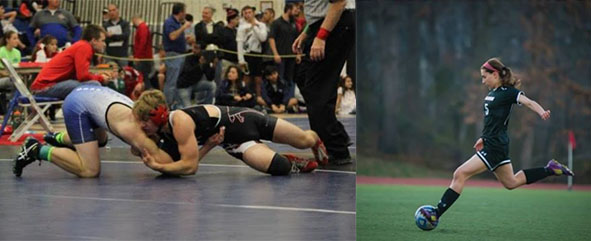Overuse and limited recuperation can lead to premature injuries

October 11, 2016
There were 30 minutes left in the half. The score was tied at zero, and she had the ball, but then she fell.
“There was a terrible, terrible pain, and I heard a sound in my leg and then I fell,” Madison Varsity Soccer player Alyssa Serveiss (’17) said. During one of last year’s preseason soccer games, Serveiss tore her anterior cruciate ligament as well as her lateral meniscus, but she still wanted to continue playing.
“I was able to walk off the field,” Serveiss said. “I wanted to go back in for the second half, but they wouldn’t let me.”
Serveiss is one of the many dedicated Madison student-athletes who have suffered from a premature injury, an injury that does not normally occur at a young age. The age required for an injury to be declared as premature depends on the injury and its extent. These injuries greatly affect how an athlete participates in practices, games and everyday life.
The athletic trainers at Madison address these injuries on a day-to-day basis.
“[There are] a wide variety of injuries that go from injuries that are debilitating and need to keep you out of play to injuries that you can grind through and they will not get worse,” Derrick Rauenzahn, Madison Physical Education teacher and personal trainer, said. Many athletes, however, decide to not seek help.
“There are always instances where someone is maybe injured but is not reporting that injury or trying to not let anyone know that they are injured because they are afraid that they will not get to play,” Rauenzahn said.
Not reporting an injury could potentially make it worse.
“Someone who doesn’t report a head injury would have missed a week off, but because they don’t report that head injury, they end up maybe taking another hit to the head or contact or something like that, and they end up missing months or the whole season over something that could have been cleared up in a shorter period of time,” Rauenzahn said.
Serveiss’s case is similar to a shoulder injury received by varsity wrestler Wyatt West (’17). After recovering from a collarbone injury, West tore his right shoulder labrum in a wrestling tournament.
“The next morning I woke up, and I just couldn’t move my right shoulder,” West said.
Instead of having shoulder surgery, he decided that because the season was too close, he would ignore the pain.
“The recovery time is six months. I was like, ‘That’s dumb. I’m not going to have enough time to get back,’” West said. “So, for me to wrestle next season, I had to suck it up and just deal with the pain.”
He ended up wrestling the entire season with a torn shoulder. Then, before the postseason began, he tore his left shoulder as well.
“The second time I tore my shoulder, I felt it. It hurt a lot. I knew as soon as it happened that I tore it,” West said.
Serveiss and West both underwent surgery and over six months of rehab. They also experienced a serious mental toll.
“The day after my surgery I couldn’t even lift my leg,” Serveiss said. “It got better, but mentally it was really hard.”
Many Madison students have gone through a wide range of injuries, which is proof of how hard Madison athletes push themselves during practices and competitions.
West does not plan to wrestle next year. Serveiss, however, will be continuing her soccer career as a freshman at Miami University of Ohio. Both athletes are expected to be healthy by this upcoming season and are excited to play again.



Tubby the Turtle • Oct 24, 2016 at 8:55 pm
This is an awesome article 🙂